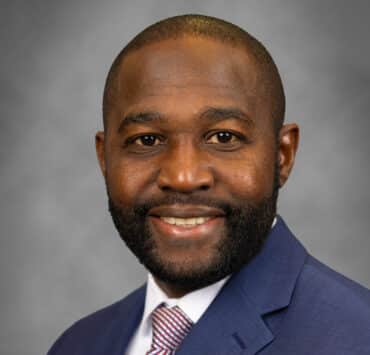Karl Giuseffi’s entire family is involved in healthcare. His dad is a general surgeon, his mom is a biochemist, his eldest brother is an orthopedic surgeon, his other brother is a dentist, and several other relatives are also doctors. “As you can imagine, [healthcare] was a conversation around the dinner table all the time,” he says, chuckling.
Watching his family’s commitment to saving lives, improving them, and putting patients first made a mark on Giuseffi. Those values continue to influence the way he views his work at Talent Plus, where he’s executive vice president of research and innovation. Though he doesn’t work in an operating room like his dad or in a lab like his mom, he impacts the industry by helping people like them thrive in the right roles.
“Today, I try to make sure organizations find individuals that are committed to a quality of care that I’d expect for my own family and to make sure they’re set up for success,” he says.
“It all boils down to: ‘Are these people that are going to be tap-dancing to work, love what they do, and love the impact they create?’”
Karl Giuseffi
He works closely with executive leaders to streamline data-driven insights that inform strategy and guide decision-making, organizational leadership, and culture. He and his team find talent for their clients by using job-specific assessments that identify the talents and qualities an individual needs to “exemplify near-perfect performance.”
“It all boils down to: ‘Are these people that are going to be tap-dancing to work, love what they do, and love the impact they create?’” he says. “We make sure organizations move to that sort of quality of care first, so they’re selecting and investing in individuals [who can] bring about the kind of impact they’re looking for.”
After an individual is identified and hired, Giuseffi helps organizations understand that their commitment to an employee must continue if they want to see long-term results.
To support those efforts, he and his team developed a leadership “readiness” scale: an assessment of an employee’s performance that examines how they’re engaging in their role over time as well as their growth and leadership capabilities. It’s offered insights to organizations and helped them bolster succession planning efforts, identify future leaders sooner, and create strategies to develop them.
“It’s a tool designed to analyze and synthesize the entire spectrum and capabilities of talents that someone has, highlighting those things to leaders who may not have a line of sight to it today. It helps them double down, develop the person, and continue to grow them,” he explains.
The innovative scale offers hope in an industry experiencing a nationwide shortage of healthcare professionals. While Giuseffi recognizes the impact the shortages have been having on the ground, he also has another concern: individuals are leaving the industry due to a lack of development resources and commitment from their organizations.
“In many ways, I wonder if it’s that organizations have taken for granted the calling that people have to healthcare, that sense of purpose, that mission,” he says. “But an organization has to pour that same energy back into a person and develop them. A plant needs to be nourished in order to thrive.”
Giuseffi’s work is informed by his expertise in neuroscience and human behavior. He received a PhD from the University of Nebraska-Lincoln in both American politics and biology, with an emphasis in advanced qualitative modeling, and served as a biopolitics and behavioral lab manager at his alma mater.
He also worked as a lead researcher at the University of South Dakota. When he joined Talent Plus in 2015, he learned about the power questions can have and how they could be used to “act as a functional MRI of a person” in order to better understand them.
“An organization has to pour that same energy back into a person and develop them. A plant needs to be nourished in order to thrive.”
Karl Giuseffi
From those experiences he learned a simple truth: people are a lot like icebergs.
“There’s everything you can see that’s above water, but most of an iceberg’s depth is all underneath; you can’t see it and it comprises so much more,” Giuseffi says. “In the neuroscience world, we’re always trying to explain or better understand human behavior, decision-making, and trying to reveal what’s underneath. It’s really just a matter of what technology you’re using to do it. Is it going to be an MRI or a set of questions?”
Despite the challenges of the industry, Giuseffi is excited about the future of healthcare. He’s seeing organizations utilize technology in profound ways to better serve patients and he’s encouraged by the emphasis that’s been placed on preventative care.
When asked about advice he would give to healthcare leaders seeking to develop talent in their organizations, he says: “Do it immediately.”
“Stop waiting,” he adds. “You can’t act soon enough and even if you don’t think there’s a need for it right now, I promise tomorrow you will. That question of how we’re transferring knowledge when someone is retiring takes years to develop. So, if you’re not finding that talent, you’re not going to be developing it in the right way—and your competitors are paying attention to that.”


